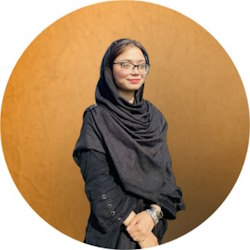Program Overview
The Bachelor of Science in Electrical Engineering (BSEE) program was started in Fall 2002. The Electrical Engineering program at COMSATS University is designed to provide students core knowledge and skills in Electrical Engineering with specialization in Power, Telecommunications, Electronics, Computer and Controls.
The Electrical Engineering program nurtures its graduates to be competent in professional practice and fulfill the technological needs of society in an ethical, moral, and socially responsible manner. Moreover, the students are trained to communicate effectively and show management and entrepreneurial potential. The students are engaged in life-long learning to continually enhance personal and professional capabilities.
The curriculum, labs, workshops, and industrial placements equip the students with the latest tools and techniques relevant to national and international industry. The Department of Electrical and Computer Engineering has an active industrial advisory board which continually provides feedback on our curriculum in relevance to the current industrial requirements.
Program Educational Objectives (PEOs)
PEO 1:
Demonstrate competence in the professional practice of Electrical engineering.
PEO 2:
Fulfill the technological needs of society in an ethical, moral, and socially responsible manner.
PEO 3:
Exhibit an ability to function and communicate effectively as an individual or team member and show management and entrepreneurial potential.
PEO 4:
Engage in life-long learning to continually enhance personal and professional capabilities.
Program Learning Outcomes (PLOs)
PLO 1:
Engineering Knowledge: An ability to apply knowledge of mathematics, science, engineering fundamentals and an engineering specialization to the solution of complex engineering problems.
PLO 2:
Problem Analysis: An ability to identify, formulate, research literature, and analyze complex engineering problems reaching substantiated conclusions using first principles of mathematics, natural sciences and engineering sciences.
PLO 3:
Design/Development of Solutions: An ability to design solutions for complex engineering problems and design systems, components or processes that meet specified needs with appropriate consideration for public health and safety, cultural, societal, and environmental considerations.
PLO 4:
Investigation: An ability to investigate complex engineering problems in a methodical way including literature survey, design and conduct of experiments, analysis and interpretation of experimental data, and synthesis of information to derive valid conclusions.
PLO 5:
Modern Tool Usage: An ability to create, select and apply appropriate techniques, resources, and modern engineering and IT tools, including prediction and modeling, to complex engineering activities, with an understanding of the limitations.
PLO 6:
The Engineer and Society: An ability to apply reasoning informed by contextual knowledge to assess societal, health, safety, legal and cultural issues and the consequent responsibilities relevant to professional engineering practice and solution to complex engineering problems.
PLO 7:
Environment and Sustainability: An ability to understand the impact of professional engineering solutions in societal and environmental contexts and demonstrate knowledge of and need for sustainable development.
PLO 8:
Ethics Apply ethical principles and commit to professional ethics and responsibilities and norms of engineering practice.
PLO 9:
Individual and Team Work: An ability to work effectively, as an individual or in a team, on multifaceted and /or multidisciplinary settings.
PLO 10:
Communication An ability to communicate effectively, orally as well as in writing, on complex engineering activities with the engineering community and with society at large, such as being able to comprehend and write effective reports and design documentation, make effective presentations, and give and receive clear instructions.
PLO 11:
Project Management: An ability to demonstrate management skills and apply engineering principles to one’s own work, as a member and/or leader in a team, to manage projects in a multidisciplinary environment.
PLO 12:
Lifelong Learning: An ability to recognize the need for, and have the preparation and ability to engage in, independent and life-long learning in the broadest context of technological change.
Curriculum Overview
The core courses are designed to develop complex engineering problem solving skills of students in the areas of power, signal processing and communications, embedded systems, IoT, software programming, digital system design, control and automation, AI and machine learning.
The students also take courses in humanities, management and social sciences to enhance their soft skills. In the final year of studies, the students are required to complete a capstone project in which they demonstrate their knowledge and skills gained during the course the program. The students are cognizant of the UN SDGs and are required to target a set of SDGs in their final year project.
| Sr. No.
|
Courses
|
No. of Courses
|
No. of Cr Hrs
|
|
Core Courses
|
| 1
|
Engineering Courses
|
21
|
75
|
| 2
|
Non-Engineering Courses
|
12
|
37
|
|
Elective Courses
|
| 3
|
Major Electives (I-IV)
|
4
|
12-16
|
| 4
|
Inter-Disciplinary Engineering Electives (IDEE)
|
1
|
3-4
|
| 5
|
EE Open Electives
|
2
|
6-8
|
Entry Requirements
As per CUI Policy/Criteria
Scheme of Studies
Career Prospects
Our graduates are in high demand in industries ranging from automation, power, defense, telecommunications, software and IT. The major advantage of the Electrical Engineering program is that our graduates have transferrable skills in the national and international job market. Our Alumni are employed in various national organizations including NTDC, Huawei, SkyElectric, Nayatel, PTCL, Telenor, Ufone, Nokia, Mobilink and renowned international organizations including Siemens, Samsung, and Dell.
Scholarships available:
There are many scholarships which are offered by national / International organizations for our students. The names of some of the scholarships are listed below:
Contact Information
Incharge Program: Dr. Muhammad Awais Javed, Associate Professor
Email: awais.javed@comsats.edu.pk
Coordinator: Ahsan Habib Khan
Ext: 051-9049-297
Student Testimonials
I am Canadian National and currently I am studying in 4th semester of Electrical and Computer Engineering. So far I've enjoyed my time at COMSATS, and have had a great experience with my fellow students and teachers. Electrical Engineering is considered as a tough degree, however our professors are supportive and made it easy to take transition from secondary studies to the University. Additionally, our professors have allowed us to contact them outside of class hours for extra support and guidance. Further, they have given us the proper feedback needed to improve in the future. I've liked our labs environment include all the friendly components that we under supervision of instructors. It provides real time project planning and conversion of simulations into useful hardware. We are also encouraged to think about global environment and lifelong learning.
Zulal Talib
Class of Spring 2026
As a student of COMSATS University Islamabad, I feel so much delighted for the fact that my time pursuing a degree in Electrical and Computer Engineering has been an extremely enlightening and life-changing journey for me. One main factor, which highly contributed to my professional development, has been the faculty's absolute devotion to excellence and innovation, which allowed me to acquire a rather strong fundamental knowledge as well as some practical skills. What I've learnt from the hands-on training, is the capacity to translate classroom teaching to real life application. I'm well prepared to compete in a changing technological environment. Furthermore, the interactive and cooperative atmosphere at COMSATS has cultivated the community spirit among the students, and this seems to make us interdependent to learn from each other. After all, at COMSATS University Islamabad, my professional trajectory in the discipline of Electrical and Computer Engineering has been furnished with the competencies, information and strength of will to pursue my aspirations I am incredibly grateful for the possibilities and attributes that have molded me to the industrious professional I am today.
Noor Fatima
Class of Spring 2024

My name is Muhammad Bilal Ahsan s/o Muhammad Ahsan Ashraf. I am 22 years old and a resident of Rawalpindi. I have completed 7 semesters at Comsats University Islamabad; thus, I am soon closing out my 4 years of tenure for a bachelor’s degree in electrical engineering.
It has been satisfying to study at COMSATS because I could perceive it since the onset of my study experience. Although the challenges of studying electrical were hard, the support of our professors has been undoubtedly invaluable. With the help of their experienced teachers, we alleviated our concern for the college environment by attending our classes and talking to our teachers in our free time, to gain more tips and feedback to improve ourselves.
Over my study period, I gained capability in electrical circuit analysis, digital systems, automation, power systems, and control system as well. The thing that I gained during the course I've been doing that is a collection of a lot of skills, digital systems, power systems and the automation of plants I have prepared myself in how to deal with various areas of electrical engineering. Through the task of designing, testing, and debugging electrical circuits, to which I add software skills such as Verilog, Proteus, MATLAB, AutoCAD, and Simulink, I have gathered the instruments needed to face daily living engineering tasks. Able to pick up new things quickly and doing well on my own and working in a team, I look forward to bringing some substantial contribution to creative projects and working along with people who think the same way about finding innovatory ideas.
Bilal Ahsan
Class of Spring 2024
